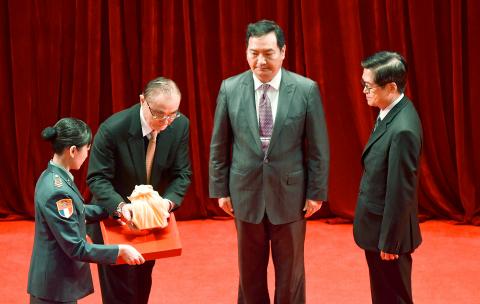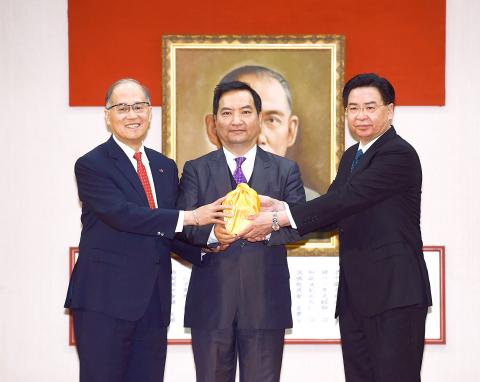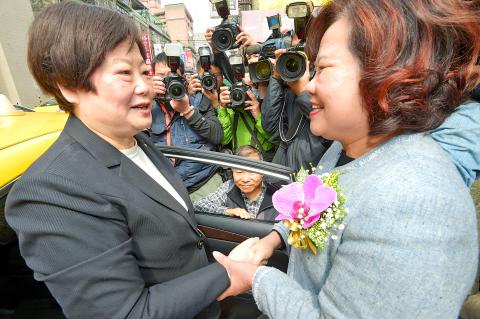Handover ceremonies were held at three government ministries yesterday as part of the Cabinet reshuffle announced on Friday.
At the Ministry of Foreign Affairs, David Lee (李大維) handed over the top post to Joseph Wu (吳釗燮), while Feng Shih-kuan (馮世寬) turned over the reins of the Ministry of National Defense to Yen Teh-fa (嚴德發) and Hsu Ming-chun (許銘春) took over as minister of labor from Lin Mei-chu (林美珠).
After being sworn in at the foreign ministry, Wu paid tribute to Lee, who has taken over the National Security Council (NSC), and pledged to continue to work closely with him.

Photo: Liu Hsin-de, Taipei Times
“Since the transition of power [in May 2016], Lee and I have been working together in the face of a new diplomatic situation and I am deeply aware of the difficulties of the job,” he said.
“I humble myself in front all of my predecessors,” said Wu, who previously served as Presidential Office secretary-general.
At the request of President Tsai Ing-wen (蔡英文), he would strive to ensure that the ministry draws upon the expertise of other government agencies to better promote Taiwan’s diplomacy, Wu said.

Photo: Fang Pin-chao, Taipei Times
Lee told the audience at the ceremony that Wu was the perfect choice to serve as foreign minister, since he has a deep understanding of the work.
There were no speeches at the defense ministry during the brief ceremony presided over by Minister Without Portfolio Lo Ping-cheng (羅秉成) that saw Feng handed over the seal of office to Yen, a retired three-star Army general who has served as chief of the General Staff of the Armed Forces, vice minister of defense and, most recently, as NSC secretary-general.
However, Feng later posted some farewell comments on the military spokesman’s Facebook page.

Photo: Chang Chia-ming, Taipei Times
He had hoped to visit troops stationed on outlying islands and conscripts undergoing their four-month basic training, but those plans had to be canceled because of his new mission to take the helm of a government-funded think tank, the Institute for National Security Studies, Feng wrote.
The institute, which will focus on China’s military, is scheduled to open in May.
Minister without Portfolio Lin Wan-i (林萬億) presided over the handover at the Ministry of Labor.
Hsu, a former deputy mayor of Kaohsiung, said she would work to protect the rights of workers rather than acting as a rubber stamp for the government.
The latest amendments to the Labor Standards Act (勞動基準法) mandate that the “one fixed day off and one flexible rest day” per week policy will take effect on Thursday, so she will not have a honeymoon period in her new post given that the ministry has to start labor inspections that same day, Hsu said.
Hsu said she will honor her promise to strive for workers’ rights by fulfilling her responsibilities as a supervisor.

MAKING WAVES: China’s maritime militia could become a nontraditional threat in war, clogging up shipping lanes to prevent US or Japanese intervention, a report said About 1,900 Chinese ships flying flags of convenience and fishing vessels that participated in China’s military exercises around Taiwan last month and in January last year have been listed for monitoring, Coast Guard Administration (CGA) Deputy Director-General Hsieh Ching-chin (謝慶欽) said yesterday. Following amendments to the Commercial Port Act (商港法) and the Law of Ships (船舶法) last month, the CGA can designate possible berthing areas or deny ports of call for vessels suspected of loitering around areas where undersea cables can be accessed, Oceans Affairs Council Minister Kuan Bi-ling (管碧玲) said. The list of suspected ships, originally 300, had risen to about

DAREDEVIL: Honnold said it had always been a dream of his to climb Taipei 101, while a Netflix producer said the skyscraper was ‘a real icon of this country’ US climber Alex Honnold yesterday took on Taiwan’s tallest building, becoming the first person to scale Taipei 101 without a rope, harness or safety net. Hundreds of spectators gathered at the base of the 101-story skyscraper to watch Honnold, 40, embark on his daredevil feat, which was also broadcast live on Netflix. Dressed in a red T-shirt and yellow custom-made climbing shoes, Honnold swiftly moved up the southeast face of the glass and steel building. At one point, he stepped onto a platform midway up to wave down at fans and onlookers who were taking photos. People watching from inside

Japan’s strategic alliance with the US would collapse if Tokyo were to turn away from a conflict in Taiwan, Japanese Prime Minister Sanae Takaichi said yesterday, but distanced herself from previous comments that suggested a possible military response in such an event. Takaichi expressed her latest views on a nationally broadcast TV program late on Monday, where an opposition party leader criticized her for igniting tensions with China with the earlier remarks. Ties between Japan and China have sunk to the worst level in years after Takaichi said in November that a hypothetical Chinese attack on Taiwan could bring about a Japanese

The WHO ignored early COVID-19 warnings from Taiwan, US Deputy Secretary of Health and Human Services Jim O’Neill said on Friday, as part of justification for Washington withdrawing from the global health body. US Secretary of State Marco Rubio on Thursday said that the US was pulling out of the UN agency, as it failed to fulfill its responsibilities during the COVID-19 pandemic. The WHO “ignored early COVID warnings from Taiwan in 2019 by pretending Taiwan did not exist, O’Neill wrote on X on Friday, Taiwan time. “It ignored rigorous science and promoted lockdowns.” The US will “continue international coordination on infectious